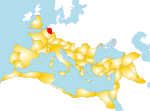Germania (/dʒərˈmeɪni.ə/ jər-MAY-nee-ə; Latin: [ɡɛrˈmaːni.a]), also more specifically called Magna Germania (English: Great Germania), Germania Libera...
28 KB (2,948 words) - 15:00, 16 August 2024
Germanía (Spanish: [xeɾ.maˈni.a]) is the Spanish term for the argot used by criminals or in jails in Spain during 16th and 17th centuries. Its purpose...
4 KB (445 words) - 00:52, 13 August 2024
38889°E / 52.51667; 13.38889 Welthauptstadt Germania (pronounced [ɡɛʁˈmaːni̯a]), or World Capital Germania, was the projected renewal of the German capital...
16 KB (1,935 words) - 09:47, 3 October 2024
Germania Superior ("Upper Germania") was an imperial province of the Roman Empire. It comprised an area of today's western Switzerland, the French Jura...
16 KB (1,716 words) - 13:18, 16 November 2024
Germania Inferior ("Lower Germania") was a Roman province from AD 85 until the province was renamed Germania Secunda in the 4th century AD, on the west...
8 KB (749 words) - 13:20, 16 November 2024
Look up Germania in Wiktionary, the free dictionary. Germania was the Roman term for the historical region in north-central Europe initially inhabited...
5 KB (584 words) - 16:24, 27 September 2024
The Germania, written by the Roman historian Publius Cornelius Tacitus around 98 AD and originally entitled On the Origin and Situation of the Germans...
17 KB (1,892 words) - 13:43, 25 October 2024
they typically include not only the Roman-era Germani who lived in both Germania and parts of the Roman empire, but also all Germanic speaking peoples from...
163 KB (20,237 words) - 12:30, 30 October 2024
of steamships have been named Germania, including:- SS Germania (1847), in service with Austrian-Lloyd 1847-73 SS Germania (1856), in service with Hamburg-Amerikanische...
776 bytes (147 words) - 13:34, 15 February 2024
Germania (also sometimes called Germania Antiqua[by whom?]) was a short-lived Roman province for the duration of 16 years under Augustus, from 7 BC to...
5 KB (573 words) - 01:49, 31 October 2024







